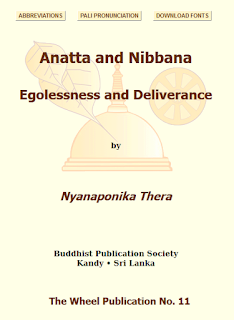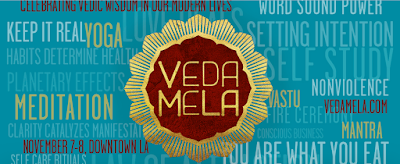| Learn some spiritual stuff, groove to music, eat nurturing foods, do some yoga. |
.
A Celebration of Yoga and the Vedic Arts
- Veda MeLA
- The REEF, 1933 S. Broadway
- Downtown Los Angeles,| Nov. 7-8, 2015
Workshops and Yoga: Sat: 8:45am-6:45pm, Sun: 8:45am-5:00pm
Exhibit Hall: Sat: 10:00am-7:00pm, Sun: 10:00am-6:00pm
Exhibit Hall: Sat: 10:00am-7:00pm, Sun: 10:00am-6:00pm
Just as Mother India hosts periodic mela or massive spiritual jamborees, so the ancient Vedas and their offshoots -- like yoga and ayurveda -- will be celebrated in the planet's throat chakra, Los Angeles.
Did the Buddha follow the Vedas?
Bhante, Dhr. Seven, Amber Larson, Ashley Wells, Wisdom Quarterly
 |
| The Buddha saw anatta directly. |
While the Buddha was not a Hindu nor a Brahmin, modern Hinduism appropriated him and other wandering ascetics who had rejected the Vedas and Vedic/Brahminical traditions, such as Mahavira the founder of Jainism. His father, King Suddhodana, as was common practice around the former IVC, had Brahmin political ministers, astrologers, and advisers.
But the Buddha did more than any other historical figure to invigorate and explain lost Vedic traditions and go beyond them to complete moksha. A Buddhist understanding of such concepts as karma, samsara, rebirth, and the self (atman) differs drastically from popular Vedic concepts. But no one much pays attention to such details.
But the Buddha did more than any other historical figure to invigorate and explain lost Vedic traditions and go beyond them to complete moksha. A Buddhist understanding of such concepts as karma, samsara, rebirth, and the self (atman) differs drastically from popular Vedic concepts. But no one much pays attention to such details.
- DETAILS: The six orthodox schools of Hinduism believe that there is an Ātman (Soul, Self) in every living being, a major point of difference with Buddhism, which explains why this illusion is not actually real -- and if one understands this with insight, enlightenment is the result -- because in an ultimate sense there is neither a permanent "self" nor "reincarnation."
 |
| No-Self and Nirvana? How? |
Instead the popular imagination is littered with harmful falsehoods/feelgood nonsense like: "The Buddha was actually a Hindu"; "the Buddha is a reincarnation of Vishnu"; "Buddhism and Hinduism are kind of the same thing." Never mind that the Buddha rejected the Vedas and central Vedic concepts like "soul" and "reincarnation," and the "true nature of reality."
 |
| This painting is deep and misleading. |
The Buddha's understanding of what happens as we pass away is so different that it needs different terms like anatta and rebirth. The endless Wheel of Life and Death (rebirth) is an unsatisfactory, impermanent, and impersonal process. So final moksha (liberation) means bringing about the end of samsara -- but that's not what Hindus (or most Mahayana Buddhists) are taught.
People would rather be reborn in a heaven, even if that means falling again and again into lower worlds full of suffering later. And the thinking is that if we could just make it to Brahma's heaven or "be at one with" Brahman, then we'd be free and enlightened. But actual enlightenment and freedom would not result in that. Such aims are not what the Buddha teaches as Buddhist liberation (nirvana), so how can anyone say the Buddha was a Hindu or a practitioner of Brahmanism or had nothing more to teach than what was already being taught in the world?
People would rather be reborn in a heaven, even if that means falling again and again into lower worlds full of suffering later. And the thinking is that if we could just make it to Brahma's heaven or "be at one with" Brahman, then we'd be free and enlightened. But actual enlightenment and freedom would not result in that. Such aims are not what the Buddha teaches as Buddhist liberation (nirvana), so how can anyone say the Buddha was a Hindu or a practitioner of Brahmanism or had nothing more to teach than what was already being taught in the world?
The Buddha revolutionized Indian spiritual thinking and, apart from violent Hindu Nationalist movements, Buddhism and Hinduism get along well. Hinduism considers itself the preserver of the Vedas, which are much older than Hinduism (which began with Sri Shankara only a few centuries ago). The Vedas began with the Indus Valley Civilization near modern India.
Keynote Speakers
Keynote Speakers
 |
| Speaker Mallika Chopra |
In addition to Ayurveda expert and world spiritual teacher praised by the Parliament of World Religions for work fostering interfaith understanding "Mother Maya" Tiwari's opening keynote on "Living Ahimsa" (Sat., Nov. 7, 12:15-1:30pm), a closing keynote will be delivered by Mallika Chopra on "Living with Intent" (Sun, Nov. 8, 12:15-1:30pm).
She is the founder and CEO of Intent.com, who launched MTV India and launched the Heal the World Foundation. "Living with Intent" is a practical yet deeply personal session to share the wisdom and actionable steps gained from thought leaders and years of exploration.
She is the founder and CEO of Intent.com, who launched MTV India and launched the Heal the World Foundation. "Living with Intent" is a practical yet deeply personal session to share the wisdom and actionable steps gained from thought leaders and years of exploration.
The Vedas (noun; plural): the most ancient Indus Valley Civilization, Brahminical, and modern Hindu scriptures or sacred text, literally "Knowledge Books" from the Vedic period in India; written in early Sanskrit and containing philosophy, the worship of gods [just like the Judeo-Christian Bible's plurality of gods], and guidance on [biblical style] ritual.
- Mela (noun): a meeting, an assembly, a cultural fair, a spiritual gathering.
- Ayurveda (noun): knowledge of health, longevity, diet, natural healing.
- Veda MeLA is a unique celebration of the massive modern emergence of arts and sciences inspired by the ancient Vedas.
Blossoming in the cultural hub of downtown Los Angeles, Veda MeLA creates an unparalleled educational, inspirational, and safe space for the burgeoning subculture of yogis and Vedic enthusiasts to explore, learn, and grow on every level.
- FEATURING: Globally-celebrated speakers, authors, yogi(ni)s, and social change activists
- Beyond-introductory topics in Yoga, Ayurveda, Jyotish, Vastu, Mantra, Meditation, and Yantra
- In-depth 1.25-hour workshops and yoga classes
- 3-hour immersions with master teachers
- A schedule that supports ease in the experience
- Open concerts during workshop breaks
- An energetically-aligned and beautiful venue with fantastic exhibitors
- 100% of net profit from our incredible fundraising events go directly to YogaGivesBack and Mother Om Mission! More






















































































































































































































































No comments:
Post a Comment